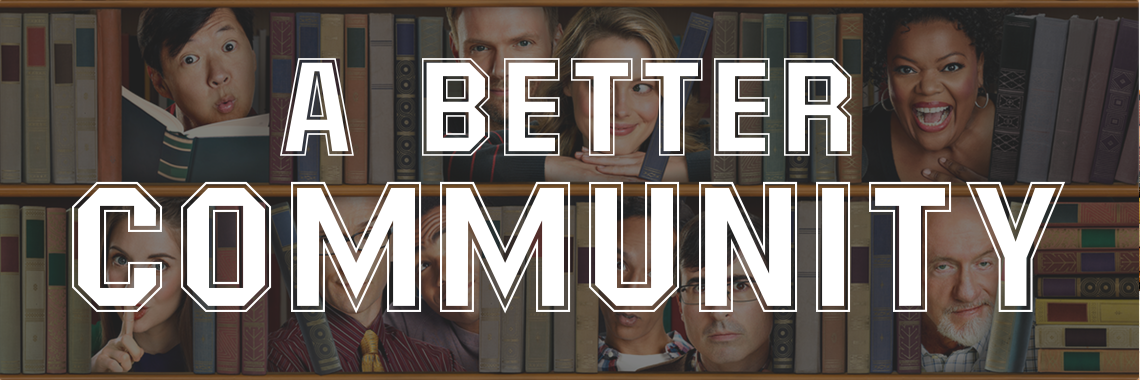
Over at the Creek Road blog I’ve started a little series overthinking my favourite TV series – Community.
“Community gives us a picture of a group of people coming together at Greendale Community College, initially united through selfishness and a desire to further their own agendas, but eventually staying together because they love one another and are prepared to make sacrifices. The show celebrates community, but it also shows that there are natural limits to this sort of community without Jesus, without a substantial community-defining act of sacrificial love to turn to when community life gets hard.
The community in Community is a genuine community, it can teach us some lessons for how we think of church community, but it’s a community that is limited in scope – and there are some ways church is ultimately a much greater form of community than anything a bunch of people can imagine or create without the cross of Jesus.”
While I was looking for some nice quotes from Community that had already been transcribed, I came across this cracker of a post from elsewhere that has nailed exactly what it is that makes Community hum. Especially when Dan Harmon is in control.
“In the best Community episodes, the show doesn’t pull its punches: characters end up hurting each other, sometimes deeply. And the best resolutions are the ones in which its characters can’t just shrug off each other’s problems as trivial, acknowledge that everybody’s secretly good and wonderful, hug! kiss! let’s forget this ever happened! Community’s ideal resolution is darker than that: it’s the one in which people face each other and say, I’m f**** up. I hurt people. And if I’m given another reason to hurt you again, I’ll do it, unless I make an active effort not to do that. Heck, even then I’ll probably hurt you still.
This is what makes the twee-ness of the music, the over-sweetness of the visuals (in which colors are rich and everything’s well-composed and characters have nary a hair out of line), acceptable, what saves Community from being sickening or intolerable. The sweetness is there to soften the sting. Community is a show about how hard communities are, how hard it is to make people behave well towards each other when sometimes there’s seemingly no reason to behave. “
This emphasis on the brokenness people bring to their relationships is a profound realisation about human nature – normally reserved for Christians with a high view of the fall, or for people exploring the selfish gene…
“Dan Harmon liked to describe Community, in interviews and on his blog, as having a “humanist” message. It always felt like that description, much like Community itself, was a pointed one, and one with a bit of a sting to it as well. Was Community heartwarming? Sure. Was it optimistic? Well, it seemed positive that people could do things despite themselves – but it always acknowledged the “despite”. If Community was a successfully humanist show, it was because it held no illusions about what “human” meant – and it wasn’t all good. In fact, much or most of humanity was rotten awful, which was what made it so funny to watch, and what made its occasional triumphs feel so rewarding…”
“…That talent, though, that ability to look at the worst parts of people and to see in them the seeds of humanity at its very best… that is crucial. That is rare. Now that I can see it for what it really is, I think it’s as important as I felt it was when I first found this show, and I can understand why that earlier Community held an appeal to me that nothing else on TV seemed to touch. It’s the harder routes, the difficult paths, the roads less taken, that force us to see the world around us for what it really is, rather than what we pretend it to be for our own convenience. Dan Harmon lives in a world of selfishness and loneliness and suffering, and he learned how to write that world in a way that felt truer, sharper, more hurtful, more honest. “